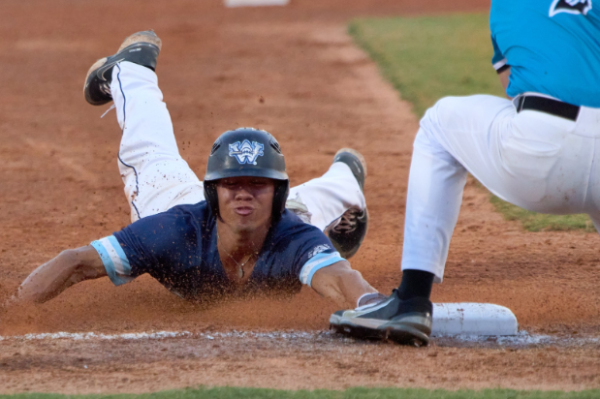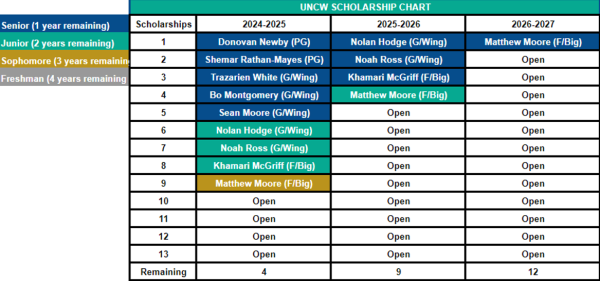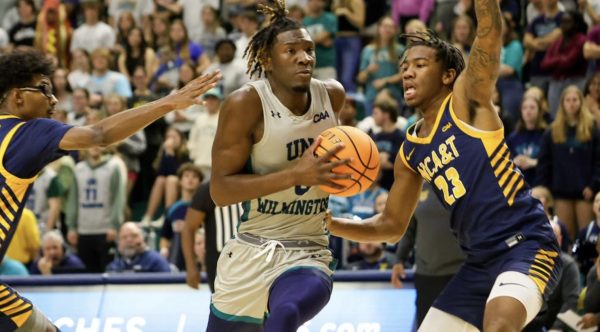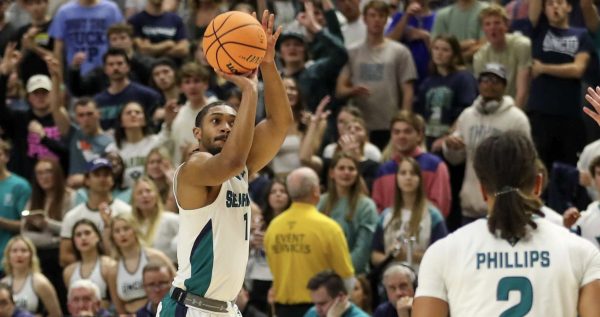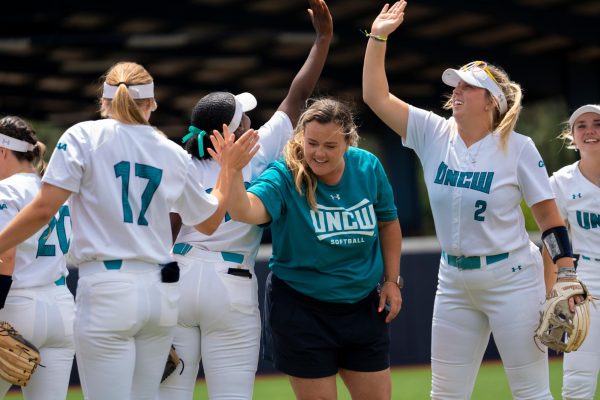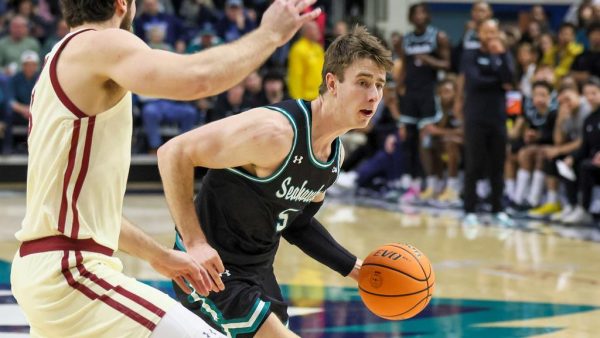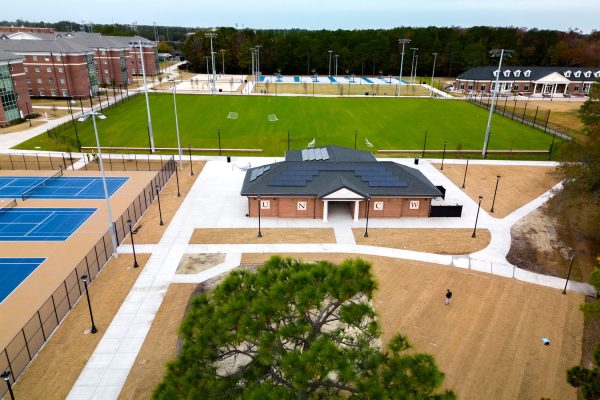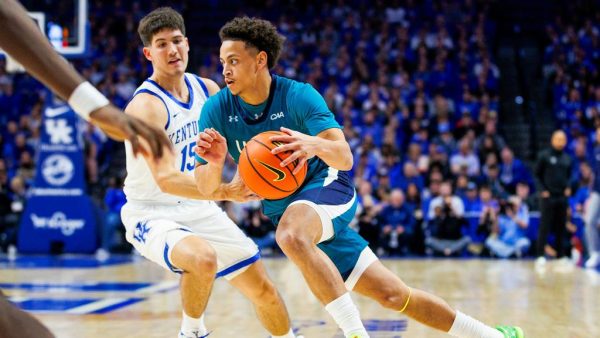Is swimming & diving a priority at UNCW
September 8, 2011
UNC Wilmington swimming meets don’t draw thousands of fans. Sammy C. Hawk doesn’t step his oversized, fuzzy shoes into the Seahawk Natatorium. And there isn’t a place where UNCW students can clamor over free T-shirts tossed by teasing faculty.
It’s just what happens to this non-revenue sport.
The revenue-generating programs at UNCW—the men’s and women’s basketball teams—have all those luxuries, while the swimming and diving programs are among the perhaps neglected Seahawk sports.
“I don’t think you’re ever going to get that in your non-revenue sports, such as swimming, track and field, soccer,” coach Dave Allen said. “Those sports are never going to get the attention that a basketball program has here.”
But, if any program deserves more recognition, the swimming and diving teams make a strong case. They’ve been the definition of stability and consistent success with 10 men’s CAA titles and four on the women’s side.
In an era where collegiate coaching jobs resemble a game of musical chairs, Allen has been the only head coach both teams have ever had. Call it unusual; call it remarkable. It’s longevity at its finest. No other Seahawk sport can claim that feat—not even the money makers on campus. Both basketball programs have had nine head coaches each.
The men’s and women’s swimming teams are two of the most dominant mid-major programs in the country, evidenced by top-25 appearances in the final CollegeSwimming.com mid-major Division I polls of the 2010-11 season. The Seahawk men grabbed 10th place and the women were in 14th.
And they’re doing it all with the same pool since the inaugural 1977-78 season and less than half scholarship funding.
NO LAUGHING MATTER
Todd DeSorbo couldn’t help it.
When Dave Allen was asked if the UNCW swimming and diving programs are fully funded, DeSorbo laughed. The four swimming coaches—Allen, DeSorbo, Tiffany Clay and Marc Ellington—are all crammed into one office where elbow space can be an issue.
So, about four feet away, the fifth-year assistant coach couldn’t help overhearing the question, and he couldn’t help but laugh at the idea of Seahawk swimming programs being fully funded.
Sure, he was smiling as he reclined in his chair and broke out into brief laughter, but it’s no laughing matter.
“We’re getting further and further (away) every year, because the cost of the school keeps going up,” Allen responded after exchanging smiles with DeSorbo. “Right now, I think our men’s team is probably around 30-40% funded. And the women’s team is probably around 40-50% funded. We’ve got a ways to go.”
Those percentages are on the in-state level. If the program wants to go out-of-state to get new players, they use more money on a scholarship than if they scour North Carolina for talent.
Since the beginning of Seahawk swimming, Allen has stressed the importance of getting the programs fully funded at least on the in-state scholarship level. Will it ever happen?
“In my lifetime? No,” Allen said. “That was always the goal for all programs to be fully funded, and I’ve heard it for 34 years and I don’t think we’ll get there.”
Any increase in scholarship budgets is hard to come by. “We haven’t really had an increase on our men’s scholarship budget since about 2003,” Allen said. “To say we’re going to get an increase, I certainly wouldn’t want to hold my breath on that.”
And, if getting fully funded on the in-state level isn’t ambitious enough, Allen said, “If we want to compete against the big boys and girls, we’re going to be fully funded on the out-of-state level, as well.
“But that’s not going to happen here,” he continued. “This school just doesn’t have those type of resources and/or they’re not willing to give those type of resources to a sport like swimming and diving.”
IN NEED OF QUALITY
A UNCW tour guide led a prospective student and his family outside of King Hall. As he narrated the campus surroundings, he told them, “We don’t have a lot of facilities, but we don’t need a lot. We need more equipment.”
That’s indicative not just of the Film Studies department building, but of the entire university. And it holds true for the Seahawk swimming and diving programs.
The general UNCW consensus asks for quality over quantity.
While Allen admits a new, longer pool will eventually have to be constructed, he’s content with the size of the pool and diving tank in the Seahawk Natatorium. It’s the quality of those that raises concerns.
According to Allen, the natatorium was built in 1976, before officially opening the following year. It is used by UNCW for intercollegiate athletics, university classes and public recreational use.
“One of the problems we have here is that it’s a facility that is used by the entire university, but when it comes time to paying for repairs… athletics has to pick up the whole bill,” Allen said. “I think some other programs in some other areas need to contribute (financially) to that.”
Through an investigation into facility records in May, The Seahawk discovered six special project requests on file for renovation to the natatorium since October 2006. The most recent request was from the athletic department, asking that the diving platform be replaced. It took nearly three months to complete and cost $20,258.43.
Just prior to the fall 2009 semester, a request from the Physical Plant department was submitted to “address mold concerns” in the natatorium room 126 used for athletic training. According to the report, a return air duct was “deteriorated” and “mold infested.” The report also called to “replace the worn, mold infested carpet.” The project offered no completion date or final cost. A note was attached claiming the “project was accomplished ‘in-house.'”
Not all requests are approved and completed, though. One request submitted July 11, 2006 asked to repair a leaking pool deck, to inspect and repair corrosion caused by the leak and to replace the ceiling in the men’s shower room in the natatorium.
Although an “Order of Magnitude” estimate of $43,000 was given by John Blume, engineering project technician, the request was not approved. If urgency from Blume wasn’t enough, Jeffrey Medlin, locksmith supervisor, sent an alarming email to Robert Montore, assistant director of the Physical Plant.
Medlin said he had visited the shower room and noted a concern that past attempts to repair the ceiling had failed. He also advised in a letter, “It would be a good idea to also check the condition of the metal lathe and support system as well as electrical and HVAC components for rust deterioration and corrosion due to the longevity of the leak… The entire ceiling may need to be replaced.”
The request never made it past the second stage of a special project request, the requesting department head. Then, Oct. 2, 2006, Tom Freshwater, director of the Physical Plant, sent a memo to Montore. He wrote, “A portion of the ceiling fell down this week… The HVAC duct visible through the opening is severely corroded and not repairable… The rest of the ceiling, including light fixtures, HVAC louvers, and access doors, is in pitiful shape. This (special project request) needs to be fast-tracked.”
Photographs of the damage confirmed Freshwater’s analysis and revealed that stalactites had formed on a concrete beam, exposed by the substantial hole in the ceiling. Stalactites form from slow leaks over long periods of time.
A new request form was processed, Oct. 23, 2006, that included everything from the previously failed request attempt except “inspect/repair corrosion and other damage.” The same $43,000 allocation was budgeted. Nearly 16 months later, the project was completed with a total cost well under budget at $15,570.
Addressing corrosion issues on the HVAC duct were not on the form. Four months later, a HVAC unit compressor failed, resulting in a $34,584.15 replacement cost. It is unclear if the incidents were related.
Allen has a concern for the immediate future of the natatorium. “We need to re-grout the decks and the pools themselves. Some of the tiles that we have now is falling out and getting dislodged, because the grout is old—it’s 34 years old,” he said. “That’s gonna affect being able to keep the pool open.”
Allen is getting something to cross off his wish-list, though. “We are in the process of getting some new sand for our filters,” he said. “That’s supposed to be done every 5 years and we’ve now been 25 years.”
When a request to fix a leaking pool deck and avoid a potential catastrophe isn’t immediately approved, Allen will take whatever improvements he can get.
Athletic director Jimmy Bass is taking on a cash-strapped UNCW athletic department that needs a lot of upgrades. Bass has said every Seahawk program can’t be helped financially all at once. “You can’t do it in a vacuum,” he said in an interview with The Seahawk last January.
But, when do the programs that have been consistently winning CAA championships for years become prioritized?
Sometimes, teams that suffer repeated losing seasons draw more attention to themselves than teams whose wins are so common that they become after-thoughts. Everyone wants to be the savior to turns things around. Bass wants to rescue UNCW athletics from community apprehension and financial hardship.
On the surface, UNCW swimming and diving doesn’t need to be rescued. They win all the time. In that regard, winning may be the worst thing UNCW swimming has done.













